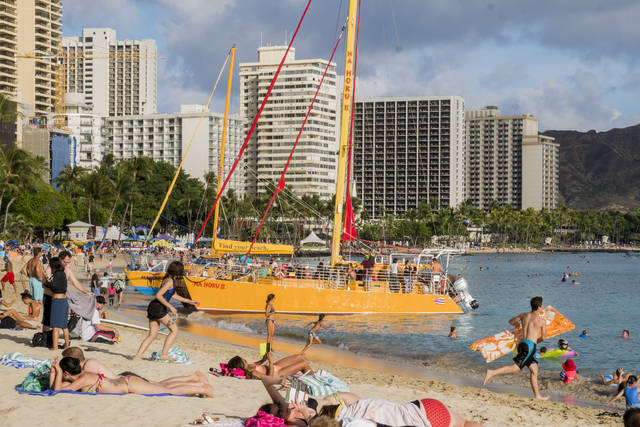February brings more visitors to Hawaii, less spending

STAR-ADVERTISER FILE
Some 782,584 visitors came to Hawaii in February 2019 up just 0.5 percent from February 2018.
Hawaii’s visitor industry in February continued on a path of bringing more visitors to Hawaii, but fewer tourism dollars.
Some 782,584 visitors came to Hawaii in February 2019 up just 0.5 percent from February 2018. Visitor spending decreased to $1.39 billion in February 2019, a nearly 3 percent drop from the same month last year.
More visitors came to Hawaii from the core U.S. West market, the state’s top international market of Japan, Canada and by cruise ship. However, fewer visitors came from the U.S. East and the category of “all other international markets,” which is everything but Japan and Canada.
Visitor spending in February increased nearly 5 percent from Hawaii’s core U.S. West market to $503 million but declined from all other major markets. Spending from the U.S. East dropped nearly 7 percent to nearly $371 million. Spending from Japan decreased 0.8 percent to just over $170 million. Visitor spending from Canada fell 0.7 percent to nearly $151 million. Spending from all other international markets plummeted more than 15 percent to nearly $189 million.
The number of days that visitors spent in Hawaii also declined nearly 2 percent due to shorter average stays from visitors across most markets. On any given day in the Hawaiian Islands in February, there were 248,244 visitors, down nearly 2 percent compared to February 2018.
Performance was mixed across the islands with Oahu reporting flat visitor arrivals and a dip in visitor spending. Hawaii island reported declines in both categories. On Kauai, visitor spending increased, while arrivals were flat. Only Maui posted gains in both arrivals and spending.
Don't miss out on what's happening!
Stay in touch with breaking news, as it happens, conveniently in your email inbox. It's FREE!
February growth in air seats was minimal. The 1,010,961 trans-Pacific air seats servicing the Hawaiian Islands in February was only up 0.5 percent from the prior year.
During the first two months of the year, visitor arrivals increased nearly 2 percent to more than 1.6 million, while spending dropped more than 2 percent to more than $3 billion.



